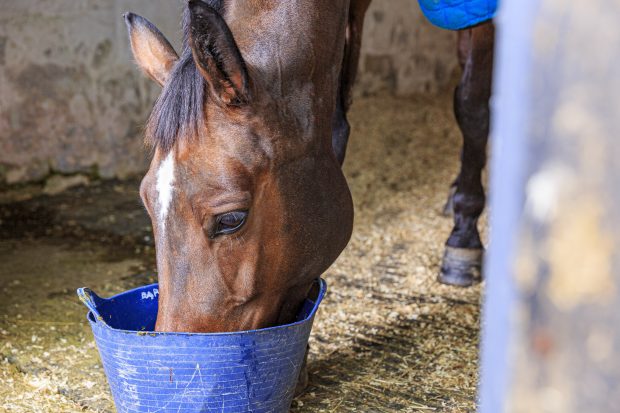Expert advice from HORSE magazine on feeding concentrates
Q: My three-year-old 15hh part-bred Thoroughbred gelding is currently fed flaked barley and rolled oats in a ratio of 3:1. With this he’s fed bran, as well as ad-lib hay. He works well on this and looks good. Should I be adding anything extra in his feed for nutritional purposes?
Nutritionist Christine Smy replies: A cereal-based diet is the most traditional ration and many horses perform well on thisfeed.
Nevertheless, although most horses seem to work well on them, cereal-based diets tend to contain deficiencies,although these can be rectified relatively easily.
The main deficiency with feeding cereals is the mineral and vitamin content, in particular calcium levels.
Calcium is an important macro mineral, essential for bone growth, maintenance and development, particularly in young horses. Deficiency in calcium has also been associated with tying-up in performance horses, as well as DOD (Developmental Orthopaedic Disease), seen in some young, fast-growing horses.
Calcium and phosphorus worktogether and horses require around twice as much calcium in the diet as phosphorus (a 2:1 calcium to phosphorus ratio).
Cereals typically contain four times as much phosphorus to calcium (a 1:4 calcium to phosphorus ratio), whichis not ideal for calcium deposition in the body.
The phosphorus is therefore present in a source which greatly reduces the calcium availability. Out of interest, bran has a ratio of around 1:11 calcium to phosphorus, which is not good, in particular, for young stock.
A calcium supplement will, therefore, need to be added to your horse’s feed. The cheapest and most popular type is calcium carbonate – known as limestone flour .
A second source could be calcium gluconate which tends to be a little more digestible.
A good broad spectrum supplement will also be required as cereals tend to be low in micro minerals such as zinc, copper and selenium. These are, again, vital for growing young stock and performance horses.
If your horse is competing regularly, start using a performance supplement to ensure the correct levels of minerals and vitamins are provided.
Protein quality is not particularly good in cereals, dueto the relative deficiency in the essential amino acids lysine and methionine. This is not a problem in horses who are used for leisure riding but young horses, performance horses and breeding stock will require a protein supplement .
This is commonly provided by feeding alfalfa containing 15 per cent protein, compared to between 9 and 10 per cent protein found in oats and barley.
I am glad to hear that you are feeding as much hay as your horse needs as this will add fibre to his diet. Oats have a higher fibre content than barley due to the husk being intact.
However, compared to hay and other forages, cereals have a low fibre content. They also contain high levels of starch which is not goodfor horses who have a tendency to suffer from azoturia.




